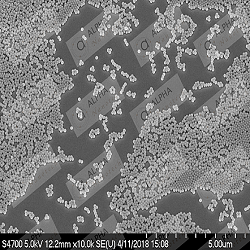Polystyrene
microspheres, particularly those with a diameter of 1 μm, are valuable tools in
various scientific and industrial fields. They offer unique properties like
uniformity, size control, and surface modifiability, making them versatile for
research and development purposes. Alpha Nanotech Inc., a leading supplier of
high-quality nanomaterials, provides precisely engineered polystyrene
microspheres, including 1 μm non-functionalized and carboxylated options.
Unveiling
the Advantages of 1 μm Polystyrene Microspheres:
Exceptional
Uniformity: Alpha Nanotech's polystyrene microspheres boast a coefficient of
variation (CV) below 3%, indicating exceptional consistency in size
distribution. This uniformity is crucial for experiments requiring precise
control over particle behavior and interactions.
Tailored
Surface Chemistry: The Polystyrene Microspheres 1μm are available
in two surface functionalities: non-functionalized and carboxylated. The
non-functionalized option offers a pristine surface for further chemical
modifications, allowing researchers to tailor the particles for specific
applications. Carboxylated microspheres, on the other hand, come
pre-functionalized with carboxylic acid groups, facilitating bioconjugation and
targeted delivery in biomedical research.
 |
| Polystyrene Microspheres 1μm |
Tunable
Concentrations and Sizes: Alpha Nanotech caters to diverse needs by offering
polystyrene microspheres in concentrations ranging from 10 to 50 mg/ml and
sizes spanning from 100 nm to 100 μm. This extensive selection empowers
researchers to choose the optimal parameters for their specific requirements.
Enhanced
Stability and Ease of Use: The microspheres are provided in Milli-Q water,
ensuring high purity and long-term stability. Additionally, they can be easily
adapted to various solvents through surface modification, expanding their
applicability in diverse environments.
Applications
of 1 μm Polystyrene Microspheres:
Calibration
Standards: Due to their exceptional uniformity, these microspheres serve as
reliable calibration standards for particle size analyzers, ensuring accurate
measurements in various research settings.
Drug
Delivery and Targeting: Non-functionalized or carboxyl polystyrene microparticles can be functionalized with biomolecules for targeted drug
delivery, enabling researchers to develop novel therapeutic strategies.
Biosensing
and Diagnostics: The microspheres' modifiable surfaces make them ideal
platforms for immobilizing biorecognition elements like antibodies or enzymes,
facilitating the development of sensitive biosensors and diagnostic assays.
Material
Science Research: Polystyrene microspheres are employed in various material
science applications, including the fabrication of photonic crystals,
metamaterials, and composites, owing to their controlled size and tunable
properties.
Conclusion:


%20Microspheres.jpg)


